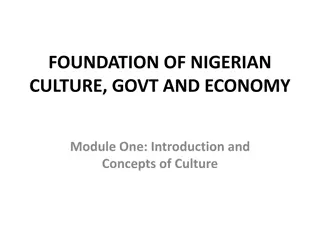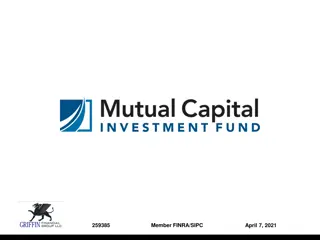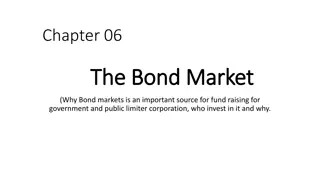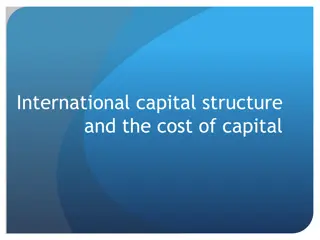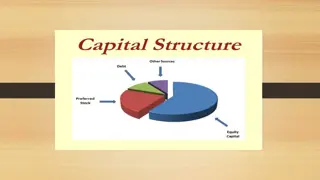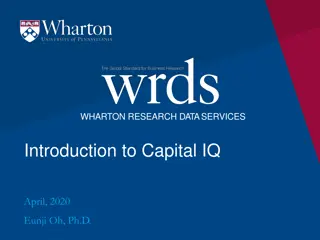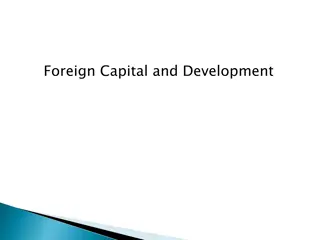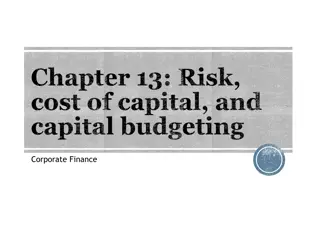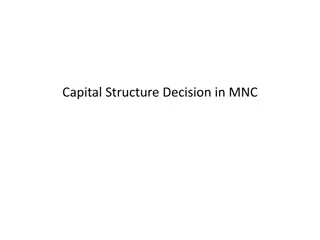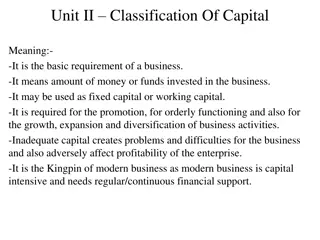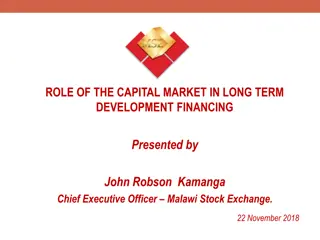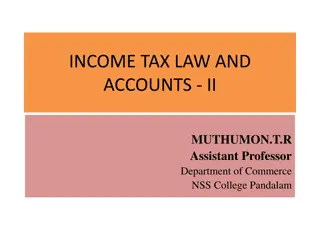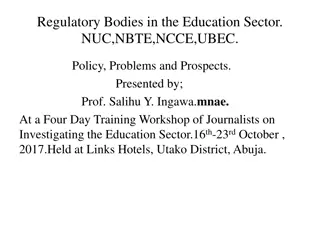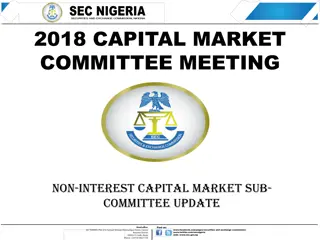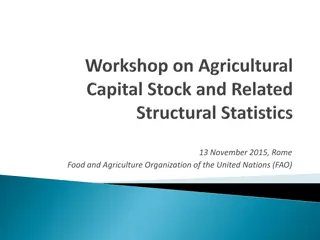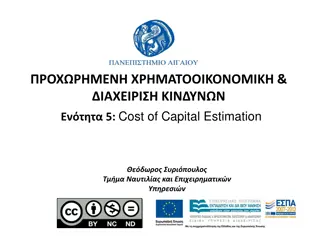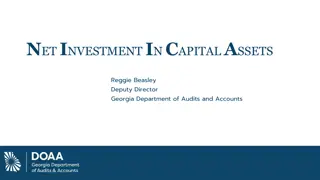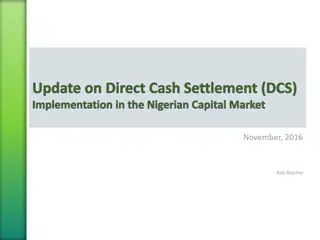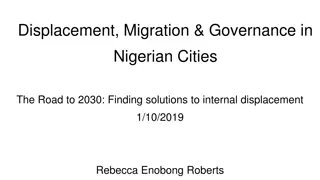Nigerian Entrepreneurial Environment
Explore the Nigerian entrepreneurial environment with a focus on political, economic, social, technological, ecological, and legal factors. Understand how these factors influence opportunities and threats for entrepreneurs and businesses.
0 views • 16 slides
CAPITAL STRUCTURE
Capital structure refers to the mix of a firm's capitalization, including debt, preference share capital, equity share capital, and retained earnings. Choosing the right components of capital is crucial based on the organization's function and risk level. Different patterns/forms of capital structur
1 views • 6 slides
Theories of Capital Structure and their Applications
The theories of capital structure explore the relationship between debt and equity in a firm's financing decisions. By optimizing the mix of debt and equity, a company can minimize its cost of capital and maximize its value. The Net Income Approach highlights the benefits of using debt to lower the
1 views • 7 slides
Discover Northern Nigerian Cuisine with Sirrin Dandanon Arewa TV Show
Delve into the rich culinary traditions of Northern Nigeria with "Sirrin Dandanon Arewa," a captivating TV show that showcases the diverse gastronomy, cultural heritage, and exquisite flavors of the region. Join the renowned chef on a flavorful journey through local markets, bustling food stalls, an
1 views • 13 slides
The Universalism of Magna Carta: Freedom of Religion in Contemporary Nigerian Law
Magna Carta, a pivotal human rights document, is explored with a focus on its religious underpinnings and its influence on modern legal systems. The parallels and divergences between Magna Carta and Nigerian customary law regarding freedom of religion are examined. The implications of contemporary N
0 views • 16 slides
Factors Influencing Economic Growth: Human Capital and Capital Goods
Factors such as investment in human capital, capital goods, natural resources, and entrepreneurship play a crucial role in determining a country's economic growth. Human capital encompasses the skills and abilities of workers, while capital goods are the tools and equipment used to produce goods and
2 views • 28 slides
Understanding Nigerian Culture, Government, and Economy: Module One
Delve into Module One of the course on Nigerian culture, government, and economy with a focus on the Introduction and Concepts of Culture. Explore definitions of culture, various types of culture, characteristics, importance, related concepts, levels, and differences between culture and ethnic group
1 views • 31 slides
Mutual Capital Investment Fund: Addressing Capital Needs in the Insurance Community
Mutual Capital Investment Fund, LLC, aims to provide capital to mutual insurance companies facing capital needs without converting to stock form or selling minority interests. Led by Mutual Capital Group, the Fund seeks commitments up to $100 million and offers a unique investment opportunity for mu
0 views • 8 slides
Understanding the Significance of the Bond Market for Government and Corporations
The bond market serves as a crucial source for fundraising for governments and public corporations. Investors use money markets for short-term needs and capital markets for long-term investments to manage risks. Various types of bonds are available, including Treasury notes and bonds, agency bonds,
0 views • 20 slides
A Dance of the Forest: A Cautionary Play by Wole Soyinka
A Dance of the Forest by Wole Soyinka is a renowned play that delves into themes of political corruption, Nigerian independence, and the interconnectedness of the living and the dead. Through a cast of characters like the Dead Man, Dead Woman, and Madame Tortoise, Soyinka crafts a cautionary tale ur
0 views • 11 slides
Understanding the Significance of Capital Market in Finance
Capital Market plays a crucial role in facilitating long-term finance for companies and governments, offering avenues for investors, promoting economic growth, and ensuring stability in securities. It encompasses functions like fund mobilization, capital formation, and technological advancement. Wit
0 views • 11 slides
Understanding International Capital Structure and Cost of Capital
Explore the concept of international capital structure and its impact on the cost of capital, including discussions on cost of equity, investment decisions, market segmentation, and cross-border financing. Learn how firms can lower their cost of capital through internationalization strategies, such
0 views • 19 slides
Features of an Appropriate Capital Structure and Optimum Capital Structure
While developing a suitable capital structure, the financial manager aims to maximize the long-term market price of equity shares. An appropriate capital structure should focus on maximizing returns to shareholders, minimizing financial insolvency risk, maintaining flexibility, ensuring the company
3 views • 5 slides
Understanding Capital IQ: A Comprehensive Overview
Explore the world of Capital IQ through this detailed guide covering its history, products on WRDS, unique features, and comparison with other data services. Learn about the extensive financial information, real-time market data, structured datasets, and people intelligence provided by Capital IQ. D
0 views • 13 slides
Understanding Foreign Capital and Its Implications on Development
Foreign capital plays a significant role in the development of a country through investments from foreign governments, institutions, and individuals. It encompasses various forms such as foreign aid, commercial borrowings, and investments that contribute to capital formation, technology utilization,
0 views • 19 slides
Maximizing the Potential of the .NG Domain: Key Insights from NiRA Workshop
Explore the significance of the .NG domain, managed by the Nigerian Internet Registration Association (NiRA), for the Nigerian internet community. Learn about NiRA's background, the Switchto.ng campaign, and the benefits of using .NG for e-commerce and online security in Nigeria.
0 views • 13 slides
Understanding Risk, Cost of Capital, and Capital Budgeting in Corporate Finance
Explore the concepts of risk, cost of capital, and capital budgeting in corporate finance, including the Capital Asset Pricing Model (CAPM), cost of equity, beta estimation, and cost of capital. Learn how to reduce the cost of capital and understand the impact of reducing the Weighted Average Cost o
0 views • 20 slides
Understanding Multinational Capital Structural Decision
Multinational corporations rely on capital to fund their expansion and projects. Capital structure decisions impact the cost of capital, profitability, and overall value. MNCs face complexities in balancing debt and equity for financing operations, choosing markets and currencies, and internationali
1 views • 37 slides
Exploring Opportunities in the Nigerian Capital Market
The Nigerian Capital Market offers abundant opportunities for individuals, institutions, and government entities, allowing for wealth creation and career development. Through avenues like REITs, investors can tap into diversified portfolios of income-producing real estate projects. Career paths with
0 views • 15 slides
Insights into the Nigerian Insurance Industry: Trends and Opportunities
The Nigerian insurance industry shows promising growth potential with low penetration rates but increasing awareness and regulatory support. Despite challenges, there has been significant growth in premiums and a shift towards a more diverse professional workforce. A comparison with similar economie
0 views • 10 slides
Understanding the Classification and Importance of Capital in Business
Capital is crucial for businesses, whether for promotion, functioning, growth, or expansion. It can be classified as promotional, long-term, short-term, or development capital. Factors influencing capital requirements include business activity, size, product nature, technology, business cycle, and l
2 views • 13 slides
Role of the Capital Market in Long-Term Development Financing
The presentation by John Robson Kamanga, CEO of Malawi Stock Exchange, delves into the role of capital markets in financing long-term development. Topics covered include defining capital markets, functions of stock exchanges, development finance, areas funded by development finance, the capital mark
0 views • 23 slides
Capital Gains and Assets Overview in Income Tax Law and Accounts
This content provides an overview of capital gains and assets in income tax law and accounts, covering topics such as types of capital assets, assets not considered capital assets, kinds of capital assets (short-term and long-term), transfer year of chargeability, computation of capital gains, and c
0 views • 15 slides
Analysis of Structural Transformation Trends in the Nigerian Economy
Economic development entails growth accompanied by structural change and technological advancement. This analysis delves into the patterns and trends of structural transformation in the Nigerian economy as discussed by Prof. Olu Ajakaiye, Executive Chairman of the African Centre for Shared Developme
0 views • 25 slides
Challenges and Reform Proposals for Regulatory Bodies in Nigerian Education Sector
The National Universities Commission (NUC) plays a vital role in regulating the Nigerian University System but faces challenges due to gaps in the legal framework. Issues include the proliferation of illegal universities and the need for amendments to empower NUC to effectively oversee licensed univ
3 views • 27 slides
Understanding Capital Market and Its Significance
Capital market refers to the market for long-term finance where financial assets like Shares, Debentures, and Bonds are traded. It plays a vital role in mobilizing funds for companies and governments, facilitating capital formation, and promoting economic growth. The classification includes Industri
0 views • 11 slides
2018 Capital Market Committee Meeting Update on Non-Interest Capital Market Products and Developments
The 2018 Capital Market Committee meeting focused on utilizing Non-Interest Capital Market products like Sukuk for infrastructural financing, regulatory challenges hindering market growth, and promoting financial inclusion. Recent developments include CBN's Exposure Draft on National Financial Inclu
1 views • 6 slides
Fiscal Year 2022 Capital Budget Presentation Overview
In the presentation to the Board of Finance, the Capital Committee outlines the Fiscal Year 2022 draft capital budget, emphasizing the importance of the Capital Improvement Program and the history of the capital program investments. The proposed budget addresses the critical need for reinvestment in
0 views • 11 slides
Development of Methodologically Robust Agricultural Capital Stock Statistics by FAO
In November 2015, the Food and Agriculture Organization of the United Nations (FAO) initiated a project to enhance Agricultural Capital Stock statistics, focusing on inclusive and efficient agricultural and food systems. The project involves developing methodologies for measuring capital stock and m
0 views • 38 slides
Estimating the Cost of Capital in Corporate Finance
Explore the process of estimating the cost of capital essential for discounted cash flows models in corporate finance. Learn how to determine the cost of debt, equity capital, and the Weighted Average Cost of Capital (WACC) by combining different sources of financing. Gain insights into capital stru
0 views • 59 slides
Abduction, Seduction, and Girl-Child: A Nigerian Perspective
The paper discusses the plight of the Nigerian Girl-Child as an endangered species, focusing on two cases - the Chibok schoolgirls abducted by Boko Haram and the controversial marriage of Senator Ahmed Yerima to a young Egyptian girl. These cases highlight the ongoing violence and abuse faced by you
0 views • 12 slides
Genetics and Incidence of Toe-Pattern Traits in Nigerian Populations
The study explores the genetic traits and incidence of toe patterns in Nigerian populations with a focus on familial and population studies to determine ancestral lineage. Various toe patterns and modes of inheritance are discussed, shedding light on the importance of toe structure in human evolutio
0 views • 22 slides
Understanding Net Investment in Capital Assets and Its Importance
Net Investment in Capital Assets is a critical component of an entity's financial position, reflecting the value of capital assets owned. It represents the portion of the net position that is not spendable as it is invested in assets. Calculating Net Investment in Capital Assets involves subtracting
1 views • 17 slides
Update on Direct Cash Settlement Implementation in Nigerian Capital Market
The update on Direct Cash Settlement (DCS) in the Nigerian Capital Market as of November 2016, by Ade Bajomo, covers progress on DCS account set-up requests to settlement banks, BVN validation by brokers, analysis of rejected DCS account set-up requests, major challenges faced, and recommendations f
0 views • 10 slides
Challenges and Solutions for Internal Displacement in Nigerian Cities
This study focuses on the self-help resettlement of conflict-based Internally Displaced Persons (IDPs) in Nigerian cities such as Lagos, Ibadan, Port Harcourt, and Yenagoa. Preliminary field findings highlight severe homelessness, lack of access to basic goods and services, and a significant number
0 views • 6 slides
Nigerian Civil Aviation Authority Flight Operations Summary (Jan-Mar 2023)
In the first quarter of 2023, Nigerian Civil Aviation Authority reported 3,073 international flights and 182,880 domestic flights. The data includes the number of airlines, total flights, delays, cancellations, baggage-related issues, passenger complaints, and resolved cases for both international a
0 views • 30 slides
Understanding Venture Capital: Key Concepts and Regulations
Venture capital is a form of financing provided to startup companies with high growth potential. It involves high risk and requires a long-term horizon, often coming in various forms like equity, conditional loans, and participation in management. The process includes stages such as seed capital, ex
0 views • 10 slides
Understanding Capital Adequacy Ratio (CAR) in Banking
Capital Adequacy Ratio (CAR) is a crucial metric in banking that measures a bank's capital against its risk. Also known as CRAR, it enhances depositor protection and financial system stability worldwide. The CAR formula involves dividing a bank's capital by its risk-weighted assets, comprising tier
0 views • 7 slides
Difference Between Capital Market and Money Market: A Comprehensive Overview
The capital market and money market serve different purposes in the financial world. While the capital market provides funds for long-term investments in securities like stocks and debentures, the money market deals with short-term borrowing and lending of funds. The capital market acts as a middlem
0 views • 4 slides
Lessons on Capital Account Liberalization in Latin America: A Historical Overview
Explore the evolution of capital account liberalization in Latin America from 1950 to 2013, highlighting key events such as the Latin American debt crisis, post-crisis capital flows, and regulatory phases. The comparison with emerging market economies sheds light on the region's capital account rest
0 views • 11 slides






